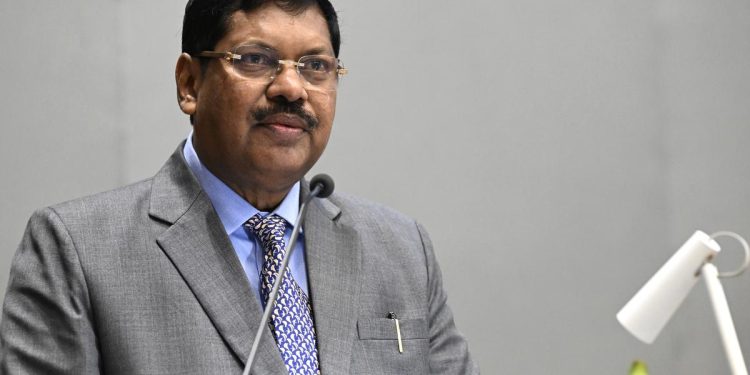Justice Bhushan Ramkrishna Gavai was sworn in as the 52nd Chief Justice of India on Wednesday, creating history as the first member of the Buddhist community to head the country’s judiciary. The oath of office was administered by President Droupadi Murmu during a formal ceremony at Rashtrapati Bhavan.
In a moment that captivated attendees, Justice Gavai touched his mother’s feet seeking her blessings immediately following the official proceedings. This gesture of filial respect stood out amid the constitutional formality of the swearing-in ceremony, offering a glimpse into the personal values of the new Chief Justice.
The ceremony was attended by numerous dignitaries including Prime Minister Narendra Modi, Lok Sabha Speaker Om Birla, Home Minister Amit Shah, Defence Minister Rajnath Singh, along with former Chief Justices and current judges from the Supreme Court and various High Courts.
Four Decades of Legal Excellence
Born on November 24, 1960, in Amravati, Maharashtra, Justice Gavai brings nearly four decades of legal experience to his new role. His career began in 1985 when he enrolled as an advocate and trained under Raja S. Bhonsale, a respected former Advocate General and High Court judge.
By 1987, he had established his own practice at the Bombay High Court and later became a regular presence at its Nagpur Bench. Throughout his career, Justice Gavai specialized in Constitutional and Administrative law, serving as standing counsel for significant institutions including the Nagpur and Amravati Municipal Corporations, Amravati University, and public sector entities like SICOM and DCVL.
His career trajectory saw him appointed as Assistant Government Pleader and Additional Public Prosecutor at the Nagpur Bench of the Bombay High Court in 1992, later becoming Government Pleader and Public Prosecutor in 2000. Justice Gavai was elevated to Additional Judge of the Bombay High Court in November 2003, becoming a permanent judge in 2005.
In May 2019, he reached the Supreme Court, where he has been part of numerous Constitution benches and delivered several landmark judgments. Justice Gavai succeeds Justice Sanjiv Khanna, who retired on Tuesday after serving as the 51st Chief Justice since November 11, 2024.
Landmark Judgments and Legal Philosophy
Throughout his tenure on the Supreme Court, Justice Gavai has contributed to several significant rulings that reflect his judicial philosophy emphasizing constitutional values, procedural fairness, and protection of marginalized communities.
His legal imprint includes being part of the bench that issued guidelines against “bulldozer justice,” emphasizing due process before property demolitions by state authorities. He authored the majority opinion upholding the government’s 2016 demonetization decision and participated in judgments establishing internet access as a constitutionally protected right.
Justice Gavai also granted bail to high-profile defendants including former Delhi Deputy Chief Minister Manish Sisodia and BRS leader K. Kavitha in the Delhi liquor policy case, citing the right to speedy justice. He led the bench that declared the arrest of NewsClick founder Prabir Purkayastha illegal due to procedural violations.
His jurisprudence on social justice is evident in his concurring opinion supporting sub-classification within Scheduled Castes for more equitable distribution of reservation benefits, and his role in restoring stringent provisions of the SC/ST Act.
In a recent judgment, Justice Gavai ruled against the National Medical Commission’s requirement that MBBS candidates have “both hands intact,” emphasizing the need for reasonable accommodations for persons with disabilities.
Justice Gavai’s term as Chief Justice will run until November 23, 2025, when he reaches the retirement age of 65. While relatively brief at approximately six months, his appointment represents a significant milestone for representation and inclusion in India’s judiciary, particularly for the Buddhist community.





